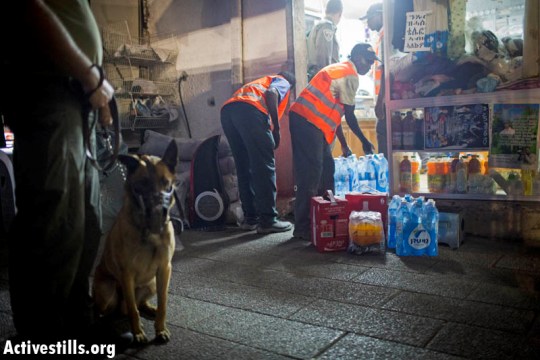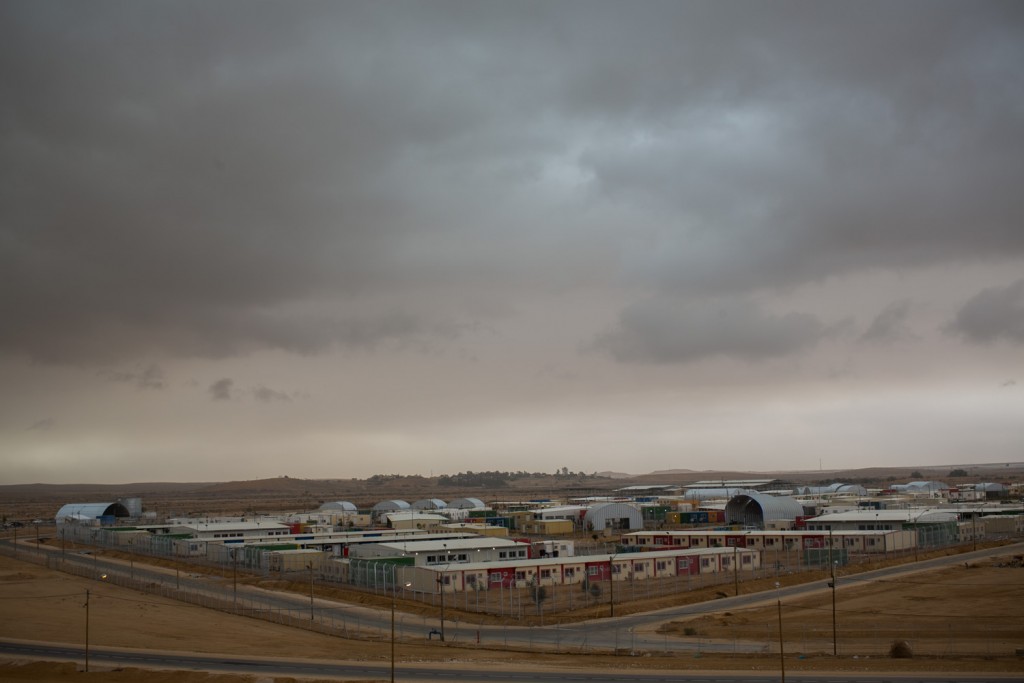Six ways the Israeli government is intentionally making the lives of asylum seekers unbearable.
By Elizabeth Tsurkov
Since 2008, the Israeli government has been implementing several policies whose purpose is to make the lives of African asylum seekers miserable, in the words of former Israeli Minister of Interior, and to coerce them to leave Israel. Both Israeli and international law prohibits the state from deporting asylum seekers to their countries of origin, leading Israel to adopt the following policies that would compel asylum seekers to leave without forcibly deportation:
1. Denial of basic rights: Since 2008, asylum seekers who reside in Israel receive a 2(A)(5), “conditional release” visa. This document does not grant its holders any rights other than the right to stay in Israel until deportation is possible. Asylum seekers are not entitled to welfare services or medical treatment, except in cases of emergency. While not legally allowed to work in Israel, asylum seekers do work, after the Israeli government promised the High Court it would not fine the employers asylum seekers. Because their visas clearly state that they do not double as work permits, many Israelis are reluctant to employ asylum seekers. As a result the latter work mostly for minimum wage or less.
2. Economic sanctions: The Israeli government adopted a number of policies to decrease asylum seekers’ salaries as well as make it difficult for them to find employment. Recently, the Israeli Tax Authority began collecting a 20 percent foreign workers tax from employers of asylum seekers. The tax was previously levied only on employers of migrant workers who are formally invited to work in Israel. Asylum seekers, however, are not entitled to the same tax breaks as migrant workers or residents — thus they pay a larger share of their low salary in taxes. In the 2014 Economic Arrangements Law, formulated by the previous government before it disbanded without passing it, the state planned on increasing the tax on employers of asylum seekers from 20 percent to 30 percent. Many employers illegally deduct the 20 percent tax from the salaries of asylum seekers.

The 2014 version of the Anti-Infiltration Law includes provisions that yet to be implemented (since they require formulating new regulations), which further cut into the salaries of asylum seekers. Under the law, employers of asylum seekers will have to place 16 percent of the asylum seekers’ pay in a deposit instead of earmarking the money for severance pay, pension and other benefits that all workers in Israel are entitled to. In addition, 20 percent of their salary after taxes of will also be placed in the deposit. Asylum seekers will be able to collect the deposit only upon leaving Israel. This means that asylum seekers will be denied the right to pension, severance pay and other benefits as long as they reside in Israel.
3. No chance of receiving refugee status: Refugee status in Israel entitles its holder to welfare and medical services, as well as the right to work. Due to the unfairness of the Israeli asylum system, the likelihood that an asylum seeker will be able to escape his or her status — devoid of rights — is close to zero. The system of examining asylum claims in Israel is very different from that of other Western countries.
The purpose of Israel’s asylum system is to reject as many people as possible under various pretenses. Until 2013, Israel prevented Eritrean and Sudanese nationals, who make up 92 percent of asylum seekers in Israel, from submitting individual asylum claims. This resulted in Israel having the lowest recognition rate of refugees in the Western world. Between 2009 and 2013 — when Israel’s asylum system was managed solely by the Ministry of Interior — only 0.15 percent of asylum requests received a positive response. The recognition rate for Eritreans stands at 0.4 percent (four Eritreans received refugee status out of 1,001 whose requests have been answered). The recognition rate for Sudanese nationals as refugees is 0 percent — not even one Sudanese citizen has received refugee status in Israel, despite the fact that over 3,100 Sudanese have filed claims since 2013. By comparison, in the first half of 2014, 84.3 percent of Eritreans worldwide received refugee status or complementary protection and 56.6 percent of Sudanese were recognized as refugees or granted complementary protection. (See table 9)
Read more: Israel hasn’t recognized one Sudanese refugee
4. Prolonged administrative detention: Starting June 2012, Israel began implementing a policy of jailing asylum seekers for prolonged periods of time without trial near the border with Egypt. This policy was struck down, twice by the High Court of Justice, but the government passed a third version of the law that would allow it to jail asylum seekers. The High Court has yet to rule on the petition filed by Israeli human rights NGOs against the current version of the law.

Under the 2014 amendment, asylum seekers who have lived in Israel for years are ordered to report to 20 months of detention without trial in the Holot detention facility, which is managed by the Israel Prison Service. After a period of detention, asylum seekers would be released back into Israel. Currently, only men without wives or small children Israel, and who entered the country over four years ago, are jailed in Holot. The detainees must sleep in the facility, take part in a daily head count and are forbidden to work outside of the facility.
5. Abuse at the Ministry of Interior: The Israeli Ministry of Interior obligates asylum seekers to renew their visas every one to two months. Without visas, asylum seekers cannot work and, if caught, may be jailed in Saharonim Prison before being transferred to 20 months of detention in Holot. In late 2013, the Ministry of Interior segregated the offices that provide services to Israelis, migrants and tourists on the one hand, and those providing services to asylum seekers. Currently, only three offices throughout Israel accept asylum seekers and their working hours are limited. This results in long lines outside these offices. Once they manage to enter the Ministry of Interior, asylum seekers undergo humiliating interrogations and clerks demand that they provide different documents — such as pay slips and apartment rental contracts in their name — before their visa is renewed. Some asylum seekers cannot obtain these documents and therefore, after waiting hours and even days in line, have to go back empty handed, fearing arrest and prolonged administrative detention.
6. Racist incitement: To justify the policy toward asylum-seekers, Israeli politicians consistently present asylum seekers as “infiltrators” who have left their homeland for Israel due to economic reasons. In addition asylum seekers, who make up about 0.5 percent of the population in Israel, are presented as a demographic threat that could destroy Israel. Politicians and community leaders also present asylum seekers as criminals and spreaders of disease, although facts do not support these assertions. This incitement, coming from prominent figures such as Prime Minister Netanyahu, various ministers, members of Knesset and rabbis, has contributed to a hostile public atmosphere toward asylum seekers, sometimes resulting in hate crimes against people with dark skin.

The purpose of all these policies is to pressure asylum seekers to leave without forcibly returning them to their homeland. Ministry of Interior representatives, both outside and especially inside detention facilities, pressure asylum seekers to “agree” to leave either to their countries of origin or to “third countries” — Uganda or Rwanda. To encourage their departure, the state also provides $3,500 for each person who leaves. Testimonies of those who have left to Sudan, Uganda and Rwanda show that asylum-seekers coming from Israel face persecution, torture, detention and threats of deportation to their countries of origin.
In March 2015, the Ministry of Interior announced a new policy: asylum-seekers who refuse to leave to Rwanda will be indefinitely jailed in Saharonim prison, across the road from Holot. The Ministry of Interior summoned several dozens of Eritrean detainees in Holot and told them that they have to choose between Rwanda and open-ended imprisonment. However, none have been transferred to Saharonim prison thus far.
Elizabeth Tsurkov is a Projects’ Director at the Hotline for Refugees and Migrants, an Israeli human rights organization.


